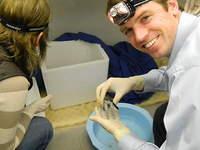MERR funding delayed
A local agency that rescues stranded sea animals is awaiting funding while it works out a new contract with state officials.
Marine Education, Research and Rehabilitation Institute serves as the sole organization that tends to stranded marine animals in the Cape Region. The group has rescued stranded seals, whales and dolphins over the past decade, but when MERR moved a nest of green sea turtle eggs last summer, it raised some questions.
"Under the Prescott Grant, it doesn't cover anything other than marine strandings," said Greg Moore, wildlife administrator for the Department of Natural Resources and Environmental Control.
The Prescott Grant is federal funding that flows through DNREC to pay a contract with MERR for rescuing stranded animals. It pays $50,000 a year to the group, said MERR executive director Suzanne Thurman. Fundraising from private sources has raised another $33,000 over the past two years, she said.
She said MERR was supposed to receive funding Nov. 1, but it's been delayed, placing the nonprofit group in dire straits.
"We're desperate to get the funding," she said.
Thurman serves as stranding coordinator in addition to her duties as executive director. She is the only paid worker; she said she works an average of 60 to 70 hours a week. Volunteers provide additional service.
Thurman receives about $60,000 a year as a contract employee saving MERR payroll tax expenses. She also pays for her own health and life insurance, she said.
An area of contention resulted after MERR received federal permission from the U.S. Fish and Wildlife administration to move 194 eggs from Delaware's first documented green sea turtle nest, discovered Aug. 18 in Cape Henlopen State Park. An incoming high tide threatened to destroy the eggs, but Thurman received permission, through a rushed process, to move the eggs. Ultimately, eight baby green sea turtles hatched, and seven were released Dec. 29 into the Gulf Stream off the North Carolina coast.
Moore said while the U.S. Fish and Wildlife permit was legal, DNREC has permitting authority, and MERR should have contacted them first.
Thurman said she spoke to DNREC later in the day, after the nest had already been moved. She did so to update them on the situation, and she didn't realize the state organization was authorized to issue permits, she said.
"It was just a matter of lack of information," she said.
If the group comes upon a turtle nest in the future, Thurman said she would handle it only at the state's discretion.
"We've always had a good relationship with the state and would like to continue," Thurman said.
Moore agrees and said he appreciates everything MERR does.
"I think it was a misunderstanding," he said. "The grant doesn't cover endangered species or a sea turtle when they come ashore and lay a nest."
Some adjustments also were needed in the way MERR files paperwork involving cases of stranded marine animals.
MERR currently is reviewing the new contract with its attorney to prevent any confusion in the future, Thurman said.
"From my perspective, it's been a lot of misunderstanding and lack of communication, and if those issues are worked out, and I don't anticipate they cannot be, it's business as usual," Moore said.
For more information on volunteering, contact MERR at www.merrinstitute.org or call 302-228-5029.
Melissa Steele is a staff writer covering the state Legislature, government and police. Her newspaper career spans more than 30 years and includes working for the Delaware State News, Burlington County Times, The News Journal, Dover Post and Milford Beacon before coming to the Cape Gazette in 2012. Her work has received numerous awards, most notably a Pulitzer Prize-adjudicated investigative piece, and a runner-up for the MDDC James S. Keat Freedom of Information Award.
























































